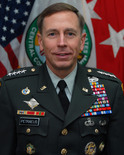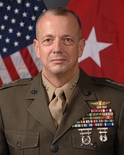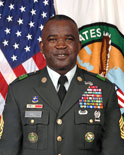General David H. Petraeus, Commander
 General David H. Petraeus assumed command of the United States Central Command in October 2008, after serving for over 19 months as the Commanding General, Multi-National Force-Iraq. Prior to his tour as MNF-I Commander, he commanded the U.S. Army Combined Arms Center and Fort Leavenworth. Before that assignment, he was the first commander of the Multi-National Security Transition Command-Iraq, which he led from June 2004 to September 2005, and the NATO Training Mission-Iraq, which he commanded from October 2004 to September 2005. That deployment to Iraq followed his command of the 101st Airborne Division (Air Assault), during which he led the “Screaming Eagles” in combat throughout the first year of Operation Iraqi Freedom. His command of the 101st followed a year deployed on Operation Joint Forge in Bosnia, where he was the Assistant Chief of Staff for Operations of the NATO Stabilization Force and the Deputy Commander of the US Joint Interagency Counter-Terrorism Task Force-Bosnia. Prior to his tour in Bosnia, he spent two years at Fort Bragg, North Carolina, serving first as the Assistant Division Commander for Operations of the 82nd Airborne Division and then as the Chief of Staff of XVIII Airborne Corps.
General Petraeus was commissioned in the Infantry upon graduation from the United States Military Academy in 1974. He has held leadership positions in airborne, mechanized, and air assault infantry units in Europe and the United States, including command of a battalion in the 101st Airborne Division (Air Assault) and a brigade in the 82nd Airborne Division. In addition, he has held a number of staff assignments: Aide to the Chief of Staff of the Army; battalion, brigade, and division operations officer; Military Assistant to the Supreme Allied Commander - Europe; Chief of Operations of the United Nations Force in Haiti; and Executive Assistant to the Chairman of the Joint Chiefs of Staff.
General Petraeus was the General George C. Marshall Award winner as the top graduate of the U.S. Army Command and General Staff College Class of 1983. He subsequently earned MPA and Ph.D. degrees in international relations from Princeton University’s Woodrow Wilson School of Public and International Affairs, and he later served as an Assistant Professor of International Relations at the US Military Academy. He also completed a fellowship at Georgetown University.
Awards and decorations earned by General Petraeus include two awards of the Defense Distinguished Service Medal, two awards of the Distinguished Service Medal, two awards of the Defense Superior Service Medal, four awards of the Legion of Merit, the Bronze Star Medal for valor, the State Department Distinguished Service Award, the NATO Meritorious Service Medal, the Gold Award of the Iraqi Order of the Date Palm, the French Légion d’Honneur, and the National Defense Cross of the Czech Republic. He is a Master Parachutist and Air Assault and Ranger qualified. He has also earned the Combat Action Badge and French, British, and German Jump Wings. In 2005 he was recognized by the U.S. News and World Report as one of America’s 25 Best Leaders, and in 2007 he was named by Time magazine as one of the 100 most influential leaders of the year and one of four runners-up for Time Person of the Year. Most recently, he was selected by Foreign Policy magazine as one of the world’s top 100 public intellectuals and by Esquire magazine as one of the 75 Most Influential People of the 21st Century.
Lieutenant General John R. Allen, Deputy Commander
 Lieutenant General John R. Allen became Deputy Commander, United States Central Command, on 15 July 2008. Following commissioning, he attended The Basic School and was assigned to Second Battalion, 8th Marines, where he served as a platoon and rifle company commander. His next tour took him to Marine Barracks at 8th and I, Washington, D.C., where he served at the Marine Corps Institute and as a ceremonial officer. Lieutenant General Allen then attended, and was the Distinguished Graduate of the Postgraduate Intelligence Program of the Defense Intelligence College. He would serve subsequently as the Marine Corps Fellow to the Center for Strategic and International Studies (CSIS). He was the first Marine Corps officer inducted as a Term Member of the Council on Foreign Relations. Returning to the Fleet Marine Force in 1985, he commanded rifle and weapons companies and served as the operations officer of Third Battalion, 4th Marines. During this period he received the Leftwich Leadership Trophy. In 1988, Lieutenant General Allen reported to the Naval Academy where he taught in the Political Science Department and also served as the Jump Officer and Jump Master of the Academy. In 1990, he received the William P. Clements Award as military instructor of the year. Lieutenant General Allen reported to The Basic School as director of the Infantry Officer Course from 1990-1992 and was subsequently selected as a Commandant of the Marine Corps Fellow, serving as a special assistant on the staffs of the 30th Commandant and the Commanding General, Marine Corps Combat Development Command. In 1994, he served as Division G-3 Operations Officer for the Second Marine Division and subsequently assumed command of Second Battalion, 4th Marines; re-designated as Second Battalion, 6th Marines. This unit served with JTF 160 in Operation Sea Signal during Caribbean contingency operations in 1994, and as part of the Landing Force of the 6th Fleet in Operation Joint Endeavor during Balkans contingency operations in 1995-1996. Following battalion command, Lieutenant General Allen reported as the Senior Aide de Camp to the 31st Commandant of the Marine Corps, ultimately serving as his Military Secretary. He commanded The Basic School from 1999 to 2001, when he was selected in April 2001 to return to the Naval Academy as the Deputy Commandant. Lieutenant General Allen became the 79th Commandant of Midshipmen in January 2002, the first Marine Corps officer to serve in this position at the Naval Academy. Lieutenant General Allen's first tour as a General Officer was as the Principal Director, Asian and Pacific Affairs in the Office of the Secretary of Defense, a position he occupied for nearly three years. During this tour, he was the recipient of the Mongolian Meritorious Service Medal, First Class and the Taiwan Order of the Resplendent Banner with Special Cravat. From 2006-2008,Lieutenant General Allen served as Deputy Commanding General, II Marine Expeditionary Force (MEF) and Commanding General, 2d Marine Expeditionary Brigade, deploying to Iraq for OIF 06-08, serving as the Deputy Commanding General of Multinational Force – West (MNF-W) and II MEF (Forward) in Al Anbar Province, Iraq. Lieutenant General Allen graduated with military honors from the Naval Academy with the Class of 1976, receiving a Bachelor of Science degree in Operations Analysis. He is a 1998 Distinguished Graduate of the National War College. He holds a Master of Arts degree in Government from Georgetown University, a Master of Science degree in Strategic Intelligence from the Defense Intelligence College, and a Master of Science degree in National Security Strategy from the National War College. Personal decorations include the Defense Distinguished Service Medal and the Legion of Merit with three Gold Stars in lieu of four awards.
Major General Jay W. Hood, Chief of Staff
 Major General Jay W. Hood assumed duties as the Chief of Staff, U.S. Central Command on July 1, 2008. General Hood is a distinguished graduate of Pittsburg State University and was commissioned as a Field Artillery Officer in 1975. General Hood's military education includes the Field Artillery Officer Basic and Advanced Courses, Basic Airborne School, and the Jumpmaster School. He is a graduate of the U.S. Army Command and General Staff College and a distinguished graduate of the U.S. Naval War College. His first duty assignment was to the 1st Battalion, 75th Field Artillery, VII Corps, United States Army Europe and Seventh Army, Germany where he served as a Fire Direction Officer and Executive Officer. In July 1979, General Hood reported to the 2d Battalion (Airborne), 321st Field Artillery, 82nd Airborne Division, Fort Bragg, N.C., where he served as Fire Support Officer. In February 1980 General Hood assumed Command of A Battery, 2d Battalion, 321st Field Artillery. In October 1981, he reported to Vicenza, Italy, where he commanded Delta Battery, 1-509th Battalion Combat Team, U.S. Army and Southern European Task Force, Italy. In summer 1984, after three years in Italy, General Hood was assigned as the Assistant Secretary of the General Staff, United States Army Europe and Seventh Army, Germany. He later served as Aide-de-Camp to the Commander in Chief, United States Army Europe and Seventh Army. In June 1988, General Hood reported to Fort Bragg, North Carolina, where he served as the Executive Officer and Operations Officer of 1st Battalion, 319th Airborne Field Artillery. He next served as the Division Artillery Operations Officer for the 82d Airborne Division during Operations Desert Shield and Desert Storm. In February 1992, General Hood assumed command of the 3rd Battalion, 319th Airborne Field Artillery, 82nd Airborne Division and was later assigned as the 82nd Airborne Division Chief of Current Operations. Upon graduation from the Naval War College in June 1995, General Hood reported to MacDill Air Force Base, Florida where he served as a Staff Officer and later as a Branch Chief, Plans and Policy Directorate, U.S. Central Command. In June 1997, he returned to the 82nd Airborne Division where he commanded the Division Artillery and later served as the Division Chief of Staff. In September 2001, General Hood assumed duties as the Chief of Staff, Operations, KFOR (Main), Film City, Camp Bondsteel, Kosovo. From August 2002 to March 2004, General Hood served as Assistant Division Commander (Forward), 24th Infantry Division (Mechanized) and Deputy Commanding General (South), First United States Army, Fort Jackson, South Carolina. From March 2004 to March 2006, he served as Commander Joint Task Force, Guantanamo, United States Southern Command, Cuba. In August 2006, General Hood reported to Fort Meade, Maryland, where he served as Commanding General, First Army Division East. On 1 July 2008, General Hood returned to U.S. Central Command and assumed his current duties Chief of Staff, U.S. Central Command. General Hood's awards and decorations include the Army Distinguished Service Medal, Defense Superior Service Medal with two Oak Leaf Clusters, Legion of Merit with Oak Leaf Cluster, Bronze Star Medal, Defense Meritorious Service Medal, Meritorious Service Medal with three oak leaf clusters, Army Commendation Medal, Army Achievement Medal with Oak Leaf Cluster, and Master Parachutist Badge. General Hood is married to the former Lynne Maladowitz of Mount Pleasant, S.C. They have two grown children, Jason and Katherine (Katie).
Command Sergeant Major Marvin L. Hill
 Command Sergeant Major Marvin L. Hill entered the Army on 18 January 1978 in Memphis, Tennessee. He assumed the duties of Command Senior Enlisted Leader for United States Central Command on 15 December 2008 following his tour of duty as Command Sergeant Major of Multi-National Force-Iraq from April 2007 to November 2008. Command Sergeant Major Marvin L. Hill entered the Army on 18 January 1978 in Memphis, Tennessee. He assumed the duties of Command Senior Enlisted Leader for United States Central Command on 15 December 2008 following his tour of duty as Command Sergeant Major of Multi-National Force-Iraq from April 2007 to November 2008.
Command Sergeant Major Hill’s assignments include: 9th Infantry Division, Fort Lewis Washington; 193d Infantry Brigade, Fort Kobbe, Panama; 327th Infantry Regiment, 101st Airborne Division (Air Assault) Fort Campbell, Kentucky; 4th Training Brigade and United States Army Noncommissioned Officer Academy and Drill Sergeant School, Fort Knox, Kentucky; United States Corps of Cadets, United States Military Academy, West Point, New York; 9th Infantry Regiment, 2d Infantry Division, Camp Hovey, Korea; Staff and Faculty, United States Army Sergeants Major Academy, Fort Bliss, Texas; 502d Infantry Regiment; Headquarters 2d Brigade, and Headquarters 101st Airborne Division (Air Assault) and Headquarters First United States Army.
Command Sergeant Major Hill has served from Rifleman to Command Sergeant Major in infantry units. Additionally, he has served as a First Sergeant, a Battalion Operations Sergeant, a Tactical Noncommissioned Officer, a Drill Sergeant, a Drill Sergeant Instructor, and as a Faculty Advisor at the United States Army Sergeants Major Academy. He also served as Task Force Command Sergeant Major for TF 1-502d Infantry, Multinational Force and Observers, Sinai, Egypt and as the Task Force Falcon (KFOR 3-A) Command Sergeant Major while serving as the Brigade Command Sergeant Major for 2d Brigade, 101st Airborne Division (Air Assault). As the Division Command Sergeant Major of the 101st Airborne Division (Air Assault), he deployed to Iraq in support of Operation Iraqi Freedom. He also served as the Task Force Command Sergeant Major for Joint Task Force-Katrina in response to Hurricanes Katrina and Rita.
Command Sergeant Major Hill’s military and civilian education includes all levels of the Noncommissioned Officers Education System, First Sergeant Course, Drill Sergeant School, Air Assault School, Rappel Master Course, Master Fitness Trainers Course, and Sniper School. Command Sergeant Major Hill is a graduate of the United States Army Sergeants Major Academy, Class 48. He has a Bachelor of Science degree in Liberal Arts and Science from St. Thomas Aquinas College and a Masters of Education in Organizational Leadership from Northcentral University.
Command Sergeant Major Hill’s awards and decorations include the Defense Superior Service Medal, the Legion of Merit, the Bronze Star Medal, the Defense Meritorious Service Medal, the Meritorious Service Medal (Seventh Award), the Joint Service Commendation Medal with “V”, the Army Commendation Medal (Fifth Award), the Joint Service Achievement Medal, the Army Achievement Medal (Fifth Award), the Good Conduct Medal (Tenth Award), the National Defense Service Medal, the Kosovo Campaign Medal, the Global War on Terrorism Expeditionary Medal, the Global War on Terrorism Service Medal, the Iraqi Campaign Medal, the Korean Defense Service Medal, the Armed Forces Service Medal, the Humanitarian Service Medal, the Noncommissioned Officers Professional Development Ribbon (Fourth Award), the Army Service Ribbon, the Overseas Service Ribbon (Second Award), the NATO Medal, and the Multinational Force and Observers Medal (Second Award). Command Sergeant Major Hill also holds the Combat Action Badge, the Expert Infantryman’s Badge, the Air Assault Badge, and the Drill Sergeant Identification Badge. |





